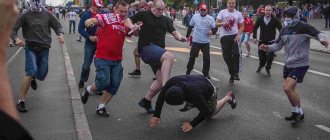One of the types of crimes provided for by the Criminal Code of the Russian Federation is refusal to provide assistance to a patient without good reason. This is an act provided for in Art. 124 of the Criminal Code of the Russian Federation, concerns those situations where a doctor or a person equivalent to him refused to perform his duties - and, as a result, harm to health was caused at least of moderate severity.
Let's consider what exactly this type of criminal act is, and what to do if you had to deal with it in practice.
What kind of offense is this?
Failure to provide assistance means the following: the person acting as the subject of this crime did not take the necessary actions aimed at improving the patient’s condition, resulting in harm to health.
When dealing with this type of crime, the following points must be taken into account:
- Only a medical professional obliged by law to provide assistance to the sick or injured can act as a criminal. In some cases, other persons may be held liable, but only when they are required by law to provide medical care.
- A health worker can be held accountable under this article only if providing assistance is part of his duties.
In particular, Art. 124 of the Criminal Code of the Russian Federation does not apply to the actions of orderlies, laboratory assistants, receptionists and other auxiliary medical personnel who do not have the necessary qualifications to help patients. Moreover, a doctor can avoid liability if the required actions do not correspond to his qualifications (in particular, a therapist who did not provide surgical assistance cannot be held accountable). - The patient had to promptly seek help from a doctor - and the doctor in this situation was obliged to provide it. In particular, it will not be criminal for a doctor to refuse to go to a patient’s home if, according to the terms of the medical services provided, the doctor was not supposed to go.
The situation is somewhat controversial when a doctor refuses a patient on the grounds that he does not have a medical insurance policy.
According to the current legislation, emergency assistance in a condition that directly threatens a person’s life or health must be provided regardless of the presence or absence of medical insurance. However, further treatment will only be provided for a fee.
As for the statute of limitations, it is regulated by Art. 78 of the Criminal Code of the Russian Federation.
Based on its content and the amount of punishment provided for in Art. 124 of the Criminal Code of the Russian Federation, we can conclude that filing a statement regarding the commission of this type of crime is useless if:
- more than 2 years from the moment the patient’s health was harmed;
- more than 6 years, if the patient died due to failure to provide assistance.
Police officer as a subject of crime
In addition to medical workers, other persons may be held liable under this article. The required basis for this will be the obligation to provide medical care, enshrined in regulations.
So, in particular, Art. 27 Federal Law “On Police” No. 3-FZ of 2011 provides in paragraph 1, part 2, that any police officer must provide first aid to citizens who have suffered from criminal acts or accidents , as well as to those who are helpless or dangerous for life or health condition. This duty always applies, regardless of the place, time of day or position held by the police officer.
Important! Similar rules apply to some other services or organizations. For example, first medical aid is required to be provided by employees of the Ministry of Emergency Situations, customs officers (if harm to health was caused by the use of weapons, special equipment or service dogs in accordance with the law), etc.
Conclusion: Yes, the subject can be a police officer.
COVID is no offense: how to defend your right to medical care
As early as next week, Russia may reach a plateau in terms of daily incidence, says professor at the Research Center for Epidemiology and Microbiology named after N.F. Gamaleya Anatoly Alshtein. But in the near future, he clarified, the growth in indicators will continue. On Monday, October 19, the operational headquarters for the prevention and control of the spread of coronavirus in the Russian Federation reported 15,982 new cases of COVID-19 infection - and this is another anti-record. The capital still ranks first in terms of daily incidence (+5376), followed by St. Petersburg (+686) and the Moscow region (+466). In anticipation of stabilization of the epidemiological situation, Izvestia answers important questions related to coronavirus. Today we are talking about how to defend your rights during a pandemic.
I called an ambulance. How long should she arrive?
According to current regulations, to provide emergency assistance (if there is a threat to the patient’s life), the team must arrive within 20 minutes; in case of emergency assistance (when there is no threat to the patient’s life), the waiting time increases to two hours.
“It should be especially noted that in some cases the ambulance has the right not to arrive,” said Maria Spiridonova, a member of the Russian Lawyers Association (RLA). — For example, if a call is used to subsequently obtain a forensic or expert opinion, establish alcohol or drug intoxication, issue a sick leave certificate and other medical certificates.
The team is not obliged to service non-core calls related to acute toothache, bandaging or injections, the lawyer added.
What to do if the ambulance is not coming?
If the wait exceeds the standards, first of all, you should contact the dispatcher again and report what is happening. Perhaps he can quickly resolve the issue.
— The right of citizens to receive free medical care in state and municipal institutions is directly enshrined in paragraph 1 of Art. 41 of the Constitution of the Russian Federation,” emphasized Maria Spiridonova.
The work of the ambulance, the lawyer added, is regulated by a whole list of regulatory documents, which includes the law “On the fundamentals of protecting the health of citizens in the Russian Federation” (Article 35), Russian Government Decree No. 1492 dated December 8, 2017, and orders of the Russian Ministry of Health dated March 26, 1999 No. 100 and dated June 20, 2013 No. 388n.
“If an ambulance refuses to arrive when called, or if the call was accepted, but the ambulance never arrived, there are several authorities to which a complaint can be sent: the management of the ambulance station, the Ministry of Health, the police and the prosecutor’s office,” the lawyer clarified. — Criminal legal consequences are also possible. Unlawful refusal to provide medical care is a criminal offense.
In particular, she explained, violators can be prosecuted under Art. 124 of the Criminal Code of the Russian Federation “Failure to provide assistance to a patient. If the unlawful actions (inaction) of ambulance workers cause moderate harm to the patient’s health, or it worsens significantly, then a complaint should be filed with the police.
— The general recommendation is to contact all authorities in writing in the form of a pre-prepared application in two copies, one of which is handed over at the destination, and the second is marked with acceptance. It will then be proof that the official appeal was accepted,” Maria Spiridonova emphasized.
The doctor did not take a coronavirus test, although I have signs of acute respiratory viral infection. Where to contact?
On the hotline for questions related to coronavirus (8-800-200-01-12), the Izvestia correspondent was asked to contact the local ministry or health department, and also report the violation to Rospotrebnadzor.
“If there are appropriate symptoms, a doctor should in any case take samples to test for coronavirus,” the hotline emphasized.
Lawyer Maria Spiridonova explained that, according to the explanations of the territorial divisions of the Ministry of Health, the test is not a prerequisite for ARVI. It is prescribed in case of arrival from other countries, contact with patients with COVID-19 or potentially infected within the last two weeks. In addition, tests will be taken for moderate or severe forms of ARVI and community-acquired pneumonia. People over 65 years old will be tested for coronavirus if they have symptoms of a respiratory infection.
— Separately, the Ministry of Health notes that the indications for taking samples for analysis are determined primarily by the attending physician. Such recommendations are already practically a standard,” the lawyer emphasized.
I have coronavirus, but I feel fine and don’t want to isolate. Will I be punished for violating it?
Yes. For violation of sanitary and epidemiological rules under Art. 236 of the Criminal Code of the Russian Federation, punishment can be a fine of up to 700 thousand rubles, restriction or imprisonment for up to two years, as well as forced labor for the same period.
“All patients with confirmed COVID-19 undergoing treatment at home personally sign Rospotrebnadzor’s orders to comply with the isolation regime and connect the monitoring system for patients with COVID-19,” the Moscow Department of Health told Izvestia.
Even if there were indications, I was not sent for a CT scan and was not connected to a ventilator. How to deal with medical negligence?
A patient who believes that his rights are being violated has the right to write appropriate complaints and statements addressed to the head of the medical institution where the doctor works. It may also be advisable to contact the Ministry of Health.
“But it is worth understanding that it is the attending physician who, taking into account the results of studies, tests, and the dynamics of the disease, must decide whether to refer the patient to a particular procedure,” noted lawyer Maria Spiridonova.
The capital’s Department of Health added that when visiting a patient with a confirmed diagnosis of COVID-19, a doctor examines him. He decides on the need for hospitalization, referral for a CT scan, or the possibility of treatment at home.
“Patients undergoing treatment at home are sent for a CT scan as prescribed by a doctor if they have symptoms of deterioration,” the department clarified. — Artificial ventilation is not a means of treating or restoring damaged lungs. The decision to connect to a ventilator can only be made by a doctor. Typically, this measure is used only for the most critically ill patients in the intensive care unit.
For patients with difficulty breathing or shortness of breath, if necessary, the doctor can prescribe oxygen support - it comes in different types and depends on the degree of respiratory failure and lung damage, the department noted.
Medicines for coronavirus are very expensive. I'm afraid that I won't be able to pay for treatment if I get sick.
According to the website stopcoronavirus.rf, if you are sick with coronavirus, all necessary medications are provided free of charge under compulsory medical insurance.
“Patients diagnosed with COVID-19 who are being treated at home receive antiviral drugs as prescribed by doctors,” the Moscow Department of Health reported. — Medicines are given to patients with coronavirus infection free of charge when a doctor visits them at home or when the patient visits an outpatient CT Center.
The decision to prescribe certain drugs can only be made by a doctor and only after examining the patient, the department emphasized. The course of treatment and dosage depend on the severity and course of the disease.
They refused to serve me at the checkout without a mask and forced me to buy one on the spot. Is this legal?
Yes, but you are not required to purchase the mask from this store.
— The store may require you to wear a mask or offer to purchase one. Store sellers can legally refuse to serve a customer without a mask, explained Maria Spiridonova.
The seller who served me did not have a mask covering his nose. So it is possible?
No. According to the virologist, professor at the National Research Center for Epidemiology and Microbiology named after N.F. Gamaleya by Anatoly Alshtein, a mask that does not cover the nose is useless and does not prevent the spread of the virus.
“They don’t wear a mask like that, you might as well wear it around your neck,” he said.
What is more effective - a mask or a respirator?
A respirator is more effective, says virologist Anatoly Alshtein. But “it’s actually harder to breathe in it,” he added.
“A medical mask needs to be changed every three to four hours, a fabric mask at least once a day,” the expert added.
When will the epidemic end?
It's difficult to predict. However, according to Professor Anatoly Alshtein, although the indicators are growing and this trend will continue for now, we may reach a plateau as early as next week.
“It is impossible to guess how long we will stay on it and whether there will be a decline after it,” he added.
Can a medical worker go unpunished?
There are no certain types of medical care that cannot be provided with impunity. However, in each specific case, it is necessary to take into account what exactly the doctor (or a person equivalent to him) could have done, what exactly was done (or not done) - and what specific consequences occurred.
Interpretation of Art. 124 of the Criminal Code of the Russian Federation
In order for the actions of the perpetrator to be considered criminal, the following is required:
- The person was obliged to provide assistance.
- No help was provided, and there were no valid reasons.
- The result was dire consequences.
- There is a causal relationship between the inaction of the responsible person and the consequences.
Good reasons
In some cases, doctors' inaction will not be criminal. Each case is individual, and when considering the case, all significant factors must be taken into account, however, some typical situations can be identified when it comes to punishment under Art. 124 of the Criminal Code of the Russian Federation will not apply:
- External reasons. For example, if the ambulance was unable to arrive because the streets were flooded, this would relieve its employees from liability.
- Intervention by outsiders obstructing the provision of assistance. The classic case here is the situation with “HIV dissidents” or “refuseniks” who obstruct medical procedures on their children - and they end up dying.
- An urgent need. For example, if there is only one surgeon working in a medical institution, and two patients require urgent surgery at once, the doctor will not be responsible for the fact that one of them’s condition worsened or died due to delay. However, here it is necessary that the doctor first assess the condition of both and make an informed choice as to who should be given first aid.
- Lack of funds to provide assistance. For example, if the hospital physically does not have the required drug, the doctor will not be responsible for failing to administer it. Here we can only talk about the responsibility of the official whose duties included providing everything necessary.
- Incompetence of a doctor for a specific disease. However, you need to remember: the basics of first aid are included in the base of medical education, and all doctors, regardless of their specialty, should be able to provide it. If a doctor, incompetent in this matter, provided emergency assistance and called the necessary specialist, but he did not have time to arrive on time, there will be no talk of criminal liability.
Important! The list is indicative only. The court will ultimately decide which reason is considered valid.
Comments on Article 124 of the Criminal Code of the Russian Federation
Object of crime . The immediate object of the crime is the life and health of the patient who needs medical care.
Victim . The law directly identifies the victim of a crime as the patient. According to the law, a patient in this case should be recognized as any person who objectively needed medical care and:
- specifically applied for its provision;
- underwent a routine examination;
- to whom medical assistance was provided without his consent;
- found himself in a situation requiring urgent medical intervention (for example, a car accident).
Moreover, from a medical point of view, the victim may not actually be sick (for example, pregnant women, women in labor).
The objective side of the crime is characterized by an act in the form of inaction (failure to provide assistance to a patient), a special situation in which the crime was committed (lack of valid reasons for failure to provide assistance), a consequence (causing moderate harm to the health of the patient) and a causal relationship between the socially dangerous act and the consequence.
The crime is considered completed from the moment of causing moderate harm to the health of the patient.
Medical care is a set of measures aimed at maintaining and (or) restoring health and including the provision of medical services. A medical service is defined as a medical intervention or a set of medical interventions aimed at the prevention, diagnosis and treatment of diseases, medical rehabilitation and having an independent, complete meaning. Because of this, refusal to provide other types of assistance (psychological, social, material, etc.), as well as failure to provide illegal assistance (for example, a justified refusal to provide narcotic drugs to a drug addict), even in the presence of socially dangerous consequences, cannot be qualified under Art. . 124 of the Criminal Code of the Russian Federation.
Before medical assistance in case of accidents, injuries, poisoning and other conditions and diseases that threaten their life and health, citizens are provided with first aid by persons obligated to provide it in accordance with federal law or with a special rule and who have appropriate training, including employees of authorities Internal Affairs of the Russian Federation, employees, military personnel and employees of the State Fire Service, rescuers of emergency rescue units and emergency services. Drivers of vehicles and other persons have the right to provide first aid if they have appropriate training and (or) skills. The regulations of the above-mentioned departments also contain the obligation of the relevant persons to provide first aid and take measures to organize medical care.
The concept of “failure to provide assistance to a patient”, therefore, also includes such actions as the refusal of the relevant subjects to call an ambulance, to transport the patient to a medical facility, etc. Other persons must, under certain conditions, be held accountable under Art. 125 of the Criminal Code of the Russian Federation “Leaving in danger.”
The objective side of the crime is expressed in the fact that the perpetrator refuses or evades providing medical care to a patient without good reason , does not perform the necessary actions that he is obliged to perform to treat the patient or save a life, or performs them in bad faith or untimely. For example, he does not provide first aid at the scene of the incident, does not use the medicine that he has and which he should use in specific conditions, does not give the victim the necessary artificial respiration, does not stop the bleeding, refuses to go to the victim’s house when called, does not examine the patient due to the lack of an insurance policy, does not refer a seriously ill patient or refuses to transport him, admit him to a medical institution, does not call the necessary specialist, etc. As a result of a person’s negligent attitude to the performance of official duties, the victim is inflicted with moderate or serious harm to health, or this leads to his death.
If the subject provided assistance to the patient, albeit in an inappropriate manner, liability under Art. 124 of the Criminal Code of the Russian Federation is excluded.
Failure to provide the required assistance to a patient by a medical professional in case of any kind of medical error , for example, in the diagnosis of the victim’s health condition (partial inaction) does not constitute this crime. Medical error, under certain circumstances, can serve as a basis for bringing the perpetrator to justice, depending on the consequences that have occurred under Part 2 of Art. 109, part 2 or part 4 of Art. 118, art. 293 of the Criminal Code of the Russian Federation.
A prerequisite for liability for failure to provide assistance to a patient is the absence of valid reasons for this by the perpetrator, which can be both subjective and objective - the illness of the person obliged to provide assistance, his incompetence in a specific situation, force majeure, extreme necessity, the priority of providing assistance to a more seriously ill patient. , lack of transport, medicine, medical instruments, etc.
References to non-working hours, fatigue, departmental or private (non-state) nature of the medical institution, etc. cannot be considered valid.
To qualify a crime, it is important to establish that the subject did not provide exactly the assistance that he should have provided, taking into account his qualifications in a particular situation. To establish the procedure for providing medical care, one should refer to the regulations of executive authorities.
A mandatory element of the crime in question is causation . To establish a causal relationship between failure to provide assistance and harm to health, it is necessary to take into account the nature of the disease, the patient’s condition and other circumstances (in some cases, a forensic medical examination is necessary to establish them). If the provision of assistance could not objectively prevent the onset of consequences in the form of harm to health, liability under Art. 124 of the Criminal Code of the Russian Federation is excluded.
The subjective side of the crime is characterized by a careless form of guilt in relation to causing moderate harm to health. Moreover, a careless form of guilt in the form of negligence is extremely rare, since medical workers, as a rule, foresee the consequences of failure to provide assistance to a patient.
The subject of the crime is a special one - a person who has reached the age of 16 years, is obliged to provide assistance in accordance with the law, agreement or special rule and has the opportunity to do so. These may be doctors who are entrusted with the duty to provide assistance to the patient, paramedics, nurses, and other persons associated with the performance of the professional functions of a medical worker in providing medical care to the patient, for example, police officers, who are obliged according to the Police Law to take urgent measures to save citizens, provide first aid, leaders of tourist groups and other persons obliged to take measures when calling a medical professional.
Persons who do not have the characteristics of a special subject, if there are grounds, are liable under Art. 125 of the Criminal Code of the Russian Federation.
At what point is the crime completed?
Since the composition of Art. 124 of the Criminal Code of the Russian Federation provides for harm to the patient’s health (Part 1) or death (Part 2), then this criminal act will be considered completed from the moment these consequences occur. If for some reason the consequences were avoided (for example, instead of an inactive person, another specialist will provide medical care), there is no need to talk about the completed crime.
Here we can talk:
- About an attempted crime - if the person obliged to provide assistance deliberately evaded, and the consequences did not occur for reasons beyond his control.
- About the complete absence of a crime - for example, if a police officer or rescuer from the Ministry of Emergency Situations handed over the victim to ambulance doctors, without even providing emergency support.
Corpus delicti
This type of action is characterized by the following:
- Subject - only persons obligated by regulations to provide medical care in established cases. An ordinary citizen cannot be held liable under this article.
- The subjective side is both direct (the culprit knew what the refusal of help would lead to and wanted such consequences to occur) and indirect (the culprit did not want the consequences, but could and was obliged to foresee them) intent.
- Object – human health, or his life (Part 2 of this article).
- The objective side is inaction, that is, the lack of assistance that the culprit should have provided, the onset of serious consequences (harm to health of a certain degree or even death). In addition, a causal relationship between these two factors is required.
Important! The objective side will be only inaction. If assistance was provided, but of inadequate quality, it will be a completely different composition, provided for in Art. 109 or art. 118 of the Criminal Code of the Russian Federation.
Responsibility
The punishment under this article is as follows:
- If moderate harm was caused .
- a fine of no more than 40 thousand rubles or 3 months’ income;
- compulsory work up to 360 hours;
- repair work up to a year;
- arrest up to 4 months.
- If the harm is serious or death occurs.
- forced labor for up to 4 years (with or without deprivation of the right to professional activity for up to 3 years);
- imprisonment for up to 4 years (with or without the same additional punishment).
What to do and where to go if left in danger?
If you had to deal with the criminal inaction of doctors, then the application should be submitted:
- To the administration of the institution where no assistance was provided.
- To an insurance organization that provides medical insurance services (for civil liability).
- Contact the police if significant health consequences have already occurred.
- To the prosecutor's office - if it is necessary to check the actions of doctors and, if necessary, initiate a criminal case.
Legal settlement
The claim is filed in the district court at the location of the medical institution where assistance was not provided.
The following may be used as evidence:
- Medical documents (medical histories, certificates, medical records, etc.).
- Testimony of witnesses.
- Conclusions of medical examinations.
When filing a claim, you must pay a state fee. Its size will depend on the claims and is determined in accordance with Art. 333.36 Tax Code of the Russian Federation. If the claim is of a non-property nature, then a fee of 300 rubles is paid.
It should also be taken into account that if a case was initiated under Art. 124 of the Criminal Code of the Russian Federation, then no duty will be paid, since we are talking about compensation for damage from a crime. In this case, the rules for drawing up a claim will be regulated by the rules of procedural law.
What can be used as evidence?
The following may be used as evidence in cases of this kind:
- Medical documents. These include medical histories, conclusions of medical commissions, examination data, etc.
- Testimony of witnesses who will confirm that there was a fact of applying for medical care - but it was not provided.
- Examination results.
- Other evidence relevant to the case. Procedural evidence does not define the exact list of evidence that can be used - and therefore the court can consider any facts relevant to the case.
Claim for moral damages
As in any other crime, the plaintiff may seek compensation for moral damages. However, the legislation does not determine exactly how it should be calculated. However, you need to prepare for the fact that the court will be skeptical about the evidence presented - and therefore it is possible to reduce the amount recovered or refuse compensation. Each case here is individual.
Judicial practice: sentences and punishment under Art. 124 of the Criminal Code of the Russian Federation
- Resolution of the Plenum of the Supreme Court of the Russian Federation dated... PLENARY OF THE SUPREME COURT OF THE RUSSIAN FEDERATION DECISION dated December 27, 2002 N 29 ON JUDICIAL PRACTICE IN CASES OF THEFT,...
- Resolution of the Plenum of the Supreme Court of the Russian Federation dated... PLENARY OF THE SUPREME COURT OF THE RUSSIAN FEDERATION DECISION of November 15, 2021 N 48 ON THE PRACTICE OF APPLICATION BY COURTS OF LEGISLATION GOVERNING FEATURES...
- Resolution of the Presidium of the Supreme Court of the Russian Federation dated... PRESIDIUM OF THE SUPREME COURT OF THE RUSSIAN FEDERATION DECISION dated December 5, 2018 N 126-P18 ON RESUMING PROCEEDINGS IN THE CASE DUE TO NEW...
- Ruling of the ECtHR dated 02/14/2017 EUROPEAN COURT OF HUMAN RIGHTS THIRD SECTION CASE “MASLOVA VS. RUSSIAN FEDERATION” (Complaint No. 15980/12) JUDGMENT…
- Decision of the Supreme Court: Resolution No. 310P13 dated... DECISION OF THE PRESIDIUM OF THE SUPREME COURT OF THE RUSSIAN FEDERATION Case No. 310-P13 Moscow January 23, 2014 Presidium of the Supreme Court of the Russian Federation...
- Decision of the Supreme Court: Determination N 203-APU17-21... THE SUPREME COURT OF THE RUSSIAN FEDERATION Case No. 203-APU17-21 APPEAL DECISION Moscow August 31, 2021 Judicial Collegium for Military Personnel of the Supreme...
- Resolution of the Plenum of the Supreme Court of the Russian Federation dated... PLENAUM OF THE SUPREME COURT OF THE RUSSIAN FEDERATION DECISION dated June 25, 2021 N 18 ON JUDICIAL PRACTICE IN CASES OF CRIMES,...
- Resolution of the Plenum of the Supreme Court of the Russian Federation dated... PLENAUM OF THE SUPREME COURT OF THE RUSSIAN FEDERATION DECISION dated December 17, 2021 N 43 ON SOME ISSUES OF JUDICIAL PRACTICE IN CASES...
- Ruling of the Constitutional Court of the Russian Federation dated March 13, 2018 N 578-O THE CONSTITUTIONAL COURT OF THE RUSSIAN FEDERATION RULING dated March 13, 2018 N 578-O ON THE REFUSAL TO ACCEPT A CITIZEN’S COMPLAINT FOR CONSIDERATION...
- Judicial Collegium for Criminal Cases, appeal:... THE SUPREME COURT OF THE RUSSIAN FEDERATION Case No. 72-APU 17-21 APPEAL DECISION Moscow October 04, 2021 Judicial Collegium for Criminal Cases...









